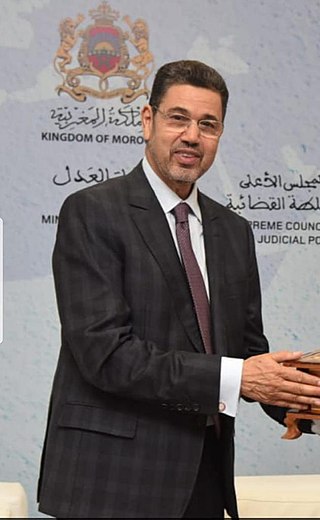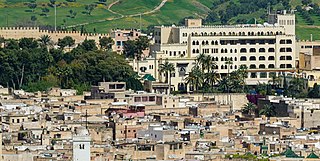
Casablanca is the largest city in Morocco and the country's economic and business centre. Located on the Atlantic coast of the Chaouia plain in the central-western part of Morocco, the city has a population of about 3.71 million in the urban area, and over 4.27 million in Greater Casablanca, making it the most populous city in the Maghreb region, and the eighth-largest in the Arab world.

Abdellatif Laâbi is a Moroccan poet, journalist, novelist, playwright, translator and political activist.

Abraham Serfaty was an internationally prominent Moroccan Marxist-Leninist dissident, militant, and political activist, who was imprisoned for years by King Hassan II of Morocco, for his political actions in favor of democracy, during the Years of Lead. He paid a high price for such actions: fifteen months living underground, seventeen years of imprisonment and eight years of exile. He returned to Morocco in September 1999.
Moroccan literature are the written and oral works of Moroccan culture. These works have been produced and shared by people who lived in Morocco and the historical states that have existed partially or entirely within the geographical area of modern-day Morocco. Apart from the various forms of oral literature, the written literature of Morocco encompasses various genres, including poetry, prose, theater, and nonfiction including philosophical and religious literature. Moroccan literature has mainly been written in Arabic and French, and to a lesser extent also in Berber languages, Judeo-Arabic, Spanish, and after the mid-19th century in English.[pages needed] Through translations into English and other languages, Moroccan literature has become accessible to readers worldwide.
Abdallah Zrika is one of the most famous poets of Morocco. His poetry is set in free verse, based on spoken language and unrivalled in contemporary Arabic literature in its spontaneity. For the Moroccan youth of the politically and socially repressive years of the 1970s, he represented the ideal of poetic writing, of freedom of living and expression.
Guy Bennett, is an American writer and translator. He lives in Los Angeles.

The history of the city of Casablanca in Morocco has been one of many political and cultural changes. At different times it has been governed by Berber, Roman, Arab, Portuguese, Spanish, French, British, and Moroccan regimes. It has had an important position in the region as a port city, making it valuable to a series of conquerors during its early history.

Mohammed Bennis is a Moroccan poet and one of the most prominent writers of modern Arabic poetry. Since the 1970s, he has enjoyed a particular status within Arab culture. Muhsin J al-Musawi states that "Bennis’ articulations tend to validate his poetry in the first place, to encapsulate the overlapping and contestation of genres in a dialectic, that takes into account power politics whose tropes are special. As a discursive threshold between Arab East and the Moroccan West, tradition and modernity, and also a site of contestation and configuration, Muhammad Bennis' self-justifications may reveal another poetic predilection, too."

Souffles or Anfas was a francophone and arabophone quarterly socio-political literary magazine published in Rabat, Morocco, between 1966 and 1972.
Ali Siqli is a Moroccan writer of children's books and drama. In 1982 he received the Great Prize of Morocco and the international King Faysal award.
Bouchta El Hayani is a Moroccan artist who started his professional career in the 1970s. Since this period he has followed a successful path to become one of the leading and most famous Moroccan artists. First and foremost he is one of the rare Moroccan painters that perfectly master drawing techniques.

Hélène Dorion, is a Canadian poet, and writer.
Abdulaziz Saud Albabtain was a Kuwaiti poet, businessman, and philanthropist.
The 1965 Moroccan riots were street riots in the cities of Morocco, originating in Casablanca in March 1965. They began with a student protest, which expanded to include marginalized members of the population. The number of casualties incurred is contested. Moroccan authorities reported a dozen deaths, whereas the foreign press and the Union nationale des forces populaires (UNFP) counted more than 1000 deaths.

The architecture of Casablanca is diverse and historically significant. Casablanca, Morocco's economic capital, has a rich urban history and is home to many notable buildings in a variety of styles. Throughout the 20th century, architecture and urban development in Casablanca evolved in a way that was simultaneously specific to the city's contexts, and consonant with international ideas.

M'hammed Abdenabaoui, born on 21 August 1954 in Khouribga, is a senior Moroccan magistrate and the former attorney general of the King at the Court of Cassation. In 2021, he was appointed by king Mohammed VI as the first President of the Court of Cassation and deputy President of the Supreme Council of the Judicial Power. He's a noted defender of the independence of the judiciary from the legislative and executive branches.

The Jamai Palace, also known as the Dar Jama'i or the Palais Jamaï, is a historic late 19th-century mansion near Bab Guissa in Fes el-Bali in Fes, Morocco. It was converted to a luxury hotel in 1919, which closed in 2014.

Claude Beausoleil was a Canadian writer, poet, and essayist.

Safaa Erruas, born in 1976 in Tétouan, is a Moroccan artist.
Mostafa Derkaoui is a Moroccan film director and screenwriter who has made revolutionary and socially-engaged films.











